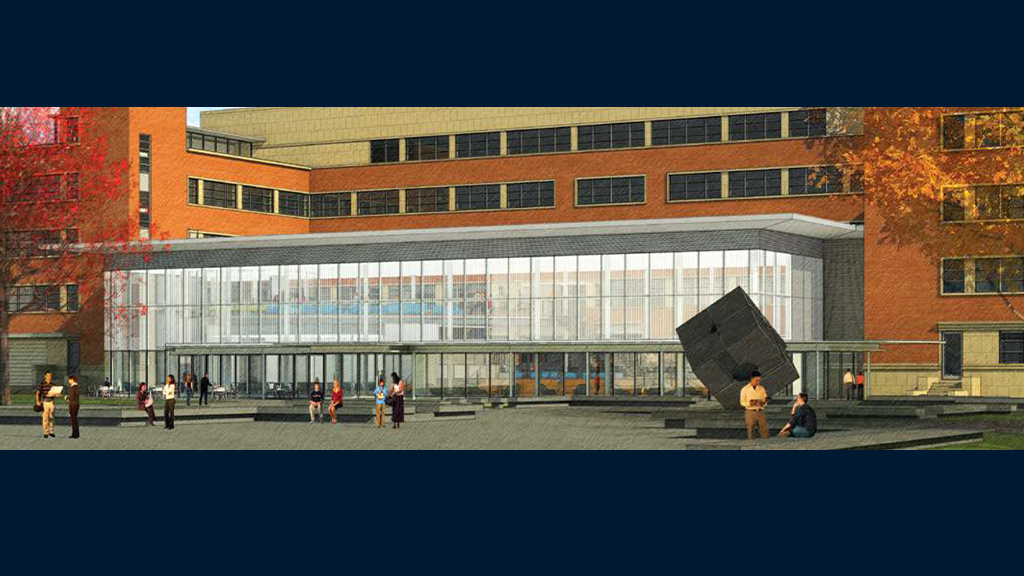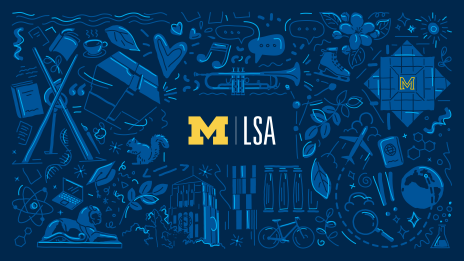Leaders & Best sat down with Dean Martin to discuss the Opportunity Hub, the dawn of U‑M’s third century, and the future of the liberal arts at LSA.
Andrew D. Martin is the former dean of the College of Literature, Science, and the Arts (LSA) and a professor of political science and statistics. As dean, he oversaw the launch of LSA’s Opportunity Hub, a program for the third century that’s redefining the reach of a liberal arts education at U‑M.
What is the Opportunity Hub and what will it mean for students at U‑M?
The Opportunity Hub is going to be a team of professionals, a place, and really an ethos. Its goal is to ensure that every one of our students has the richest experience that they can possibly have within our liberal arts and sciences college—and to connect that experience with their personal and professional success thereafter.
One of the things that’s challenging for many of our students is translating what they’re learning in the classroom to whatever it is they’re going to do next. It turns out that we’re not training students in LSA to go work in a particular profession; we’re training students in LSA to be lifetime learners and to look at the world from a number of different perspectives. The Hub helps our students take what they’re learning and translate that to be meaningful to their personal and professional success.
What do you envision for the future of the liberal arts at U‑M?
I think that a liberal arts education today is perhaps as timely as it’s ever been, given the huge societal problems that we’re facing. Coming out of this college, LSA graduates have always approached whatever they’re going to do next with the ability to look at difficult problems from multiple perspectives. Our students have always been able to think critically and communicate well, to be good advocates and good team members.
If you think about the types of jobs and the way the labor market has changed so much just in the last decade—and what those changes will look like not only a decade from now, but a century from now—I think the type of educational experience that our students are getting here is even more relevant than it ever has been. We’re certainly seeing that increased relevance in the job market. More and more employers from sectors like finance, tech, entertainment, and education are affirmatively interested in hiring students from the humanities and qualitative social sciences. They’re aware of the richness that those students can bring to an organization.
I have met with hundreds of alumni, parents, current students, and our faculty and staff, and as I did, it became clear to me that we needed to do a better job supporting our students. We need to support them not only as they explore the various pathways that are available to them here on the University of Michigan campus, but also as they connect those educational experiences with whatever is coming next. And so I think that the Opportunity Hub was born out of consideration for the future of the liberal arts. The Hub has really been driven by our community and its commitment to doing work in this area.
Cornerstones of the Hub
- Student Support
- Employer Engagement
- Coaching and Prep
- Alumni Engagement
How is that community central to the Hub’s mission and to LSA’s broader goals?
Our alumni, donors, and friends have been the catalyst of the project. They’ve been the Hub’s strongest advocates. I remember meeting with donors during my first month as dean and talking about the importance of this type of project. With their help, we’ve been able to co-create the Hub alongside our staff, our faculty, and our students. In a real concrete way, our donors have made the Hub possible.
We’re in the process of raising $75 million to support the Hub, a third of which is for programmatic support. Another third will support the capital project: the renovation of the LSA building that will hold the Opportunity Hub. Most importantly, a third will help us continue fulfilling our goal of meeting the full financial need for students taking summer internships.
The thing that I’m proudest of as dean is that for the last four summers, we have met the full financial need for our students taking summer internships. For summer 2017, we’ve awarded $1.1 million to support 500 students with financial need, such that they could take an internship here in the United States or abroad. That’s incredibly powerful. It’s something that doesn’t happen on other campuses, and it was only possible because of the support of our donors.
How else can alumni and friends stay involved with the project?
In addition to philanthropic involvement, we’d like our alumni to be engaged in at least a couple of other ways. One is by providing internships. I would encourage anybody who has access to internships to just reach out to me or to the folks at the Opportunity Hub. Make the connection so we can make sure that you’re a part of our network and available to our students.
For alumni who are interested in serving as mentors—whether that’s in a one-on-one basis or coming back and talking to a group of students who might be interested in working in a particular field or studying in a particular discipline—we’ll now have a place to support those types of interactions. The space that we’re designing is a collaborative space for students to interact with one another, to interact with our professional staff, and to interact with our alumni.
Final thoughts?
I think that one of the things that makes the University of Michigan such a special place is the philanthropic commitment of our alumni and friends. For someone who sits in my role as an academic leader, the ability to think big alongside people who have been very successful out in the real world and who are deeply committed to this university, it’s the thing that makes the University of Michigan a really special place.
It’s fitting that we’re breaking ground for the Opportunity Hub during the bicentennial year. At the beginning of the third century of LSA, I believe the Hub is going to be foundational to our success. In the future, I’d like to think that the Hub will be one of the things that defines LSA, an institution that’s viewed as the national standard to which other universities aspire. I hope that the Hub is a place that’s known not only on this campus, but by employers all over the world. And it’s my hope that students at the University of Michigan—as they have for generations—are coming to this place, diving into a rich liberal arts and sciences education, and then leveraging that education to great personal and professional success thereafter.
Catalysts for the Third Century
In its infancy, the Opportunity Hub has been energized by four foundational gifts. Together, Dick Costolo (BS ’85), the Applebaum Foundation, Steven M. Shindler (AB ’85) and Mary Kay Kosnik (AB ’83), and Elizabeth S. (AB ’94) and Jonathan M. Tisch are known as the Hub’s Catalysts. Their commitments of more than $1 million each will have broad and transformative impact at LSA, from helping revitalize the Hub space in the LSA Building, to creating innovative programs, and recruiting the talented staff who will define the Hub’s programming.
“The support from Steve and Mary Kay, from Dick, and from the Tischs and the Applebaum Foundation has allowed us to think big. It’s allowed us to do things that we wouldn’t have been able to do otherwise,” Dean Martin said. “With these lead gifts, we could actually set the aspirational goal of meeting full financial need for summer internship scholarships. It’s been transformative.”
Beyond their philanthropic support, the Hub’s donors have been especially influential by volunteering their insight and expertise. “These folks are giving of their treasure, but they’re also giving of their time and their talent,” Dean Martin said. “The ability to think with them at a high level and an on-the-ground implementation level—to make sure that we get this right, continue to learn, and continue to innovate—that’s been really special.”

